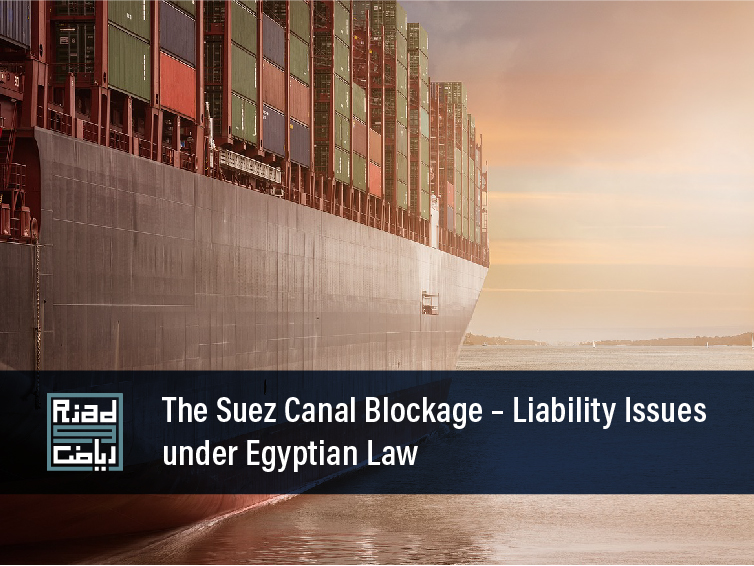
The Suez Canal Blockage – Liability Issues under Egyptian Law
The Suez Canal Authority (SCA) announced last week the successful floating of the ultra-large Ever Given ship which blocked the Suez Canal and led to the suspension of the navigation in a key artery for global trade for six days.
The SCA announced yesterday that the navigation movement at the Suez Canal is back to normal with a number of 81 vessels crossing the canal in the two directions with a total net weight of 5 million ton. The announcement confirmed that navigation in the canal continues around the clock to ensure that all waiting vessels pass as soon as possible in addition to receiving new vessels.
An investigations team has been formed to start investigating the reasons behind the incident. It has been said that the ship will remain in Egyptian waters until investigations are closed. The investigation team includes the SCA, Evergreen Company as the ship operator, as well as the Japanese owner Shoei Kisen.
The chairman of the SCA said in a TV interview on 31 March that the preliminary investigations indicate the responsibility of the ship captain due to its personal mistake as well as his reluctance to cooperate. The chairman also said that the SCA is expected to claim around USD 1 billion as compensation from Evergreen covering lost revenues of around USD 15 million per day (multiplied by the six days blocking off the waterway) and cost to the SCA in relation to dredging the canal’s bank to dislodge the ship.
With the vessel now freed, several legal questions have arisen in relation to the responsibility of the various parties for the damage resulting from the blockage. In what follows, we will shed light on some of the liability rules applicable on Suez Canal incident under Egyptian law.
Legal basis for SCA claiming compensation against Evergreen
According to Article 4 of the Navigation Rules issued by the SCA (2015 Edition),[^1] an owner, operator, and/or charterer of a vessel is liable for any damage caused either directly or indirectly by a vessel to itself or to SCA properties or personnel. They are also liable for any loss resulted from the obstruction of the navigation in the Canal. The liability extends to cover direct as well as consequential losses.
According to the recurrent court precedents in Egypt, the SCA has the authority in case of any incident in the Suez Canal to form a technical committee to investigate the reasons beyond the incident, the liability of the involved parties, and the estimated compensation suitable to remedy the incurred loss.
The Egyptian Court of Cassation held in a number of its judgments that “the SCA is not bound by the governmental regulations given its special nature as an entity running one of the essential public utilities in Egypt. The SCA is therefore allowed upon the occurrence of any incident in the waterway of the Suez Canal to establish the elements of the liability, estimate the damage through its technical units and carry out inspections for the purpose of proving the elements of the liability in terms of the fault, the damage and the causality link between them. It is also allowed to claim reparative compensation from the party who caused the damage.”
Furthermore, the SCA is empowered by virtue of the Presidential Decree No. 161 of 1963 to collect royalties and any due amounts through attachment of vessels directly without going to the court or obtain a judicial attachment order.
It is expected therefore that the SCA will use the powers conferred thereupon to decide and collect the reparative compensation that will be decided by the committee to be allocated for this purpose.
Can the SCA be held liable for the mistakes of its pilots?
Evergreen hinted – during the blockage time – that the fault lies with the two Egyptian canal pilots who boarded the vessel for guidance. A question arises therefore as to the possible liability of SCA in case it is proven that the block was a result of SCA’s pilot’s mistake.
The Navigation Rule provides in this respect that vessels’ owners, charterers and operators are responsible for any mistakes resulting from pilot’s advice or arise from SCA’s personnel (Article 4.7). It further provides that captains are solely responsible for all damages or accidents of whatever kind resulting from the navigation or handling of their vessels directly or indirectly. Pilots are not held responsible for any damage incurred during the transit owing to its advice since the vessel’s captain is the sole responsible for the vessel (Article 11 – A).
The Egyptian Commercial Maritime Law No. 8 for 1990 (“Maritime Law”) also made the vessel’s owner responsible for the acts of the vessel’s captain, sailors, pilots and any other person in the service of the vessel (Article 80), and that the vessel’s owner is solely liable for damage incurred to third parties as a result of the mistakes committed by the pilots during carrying out their job (Article 287).
In reply to a challenge against the relevant articles of the Maritime Law, the Egyptian High Constitutional Court explained in a judgment in 2010 that holding the vessel’s owner liable for the mistakes of SCA’s pilots is rational and does not violate the principle of equality or the general rules of liability of the employer for the acts of its employees. The court explained that the SCA’s pilots while guiding the vessels to pass through the Suez Canal waterway act for the benefit of the vessel and become subordinate to the vessel’s captain. The vessel therefore should be liable for the pilots’ acts even if they are hired by the SCA.
Can the SCA be held liable for the delayed ships?
According to the Navigation Rules, the SCA has the authority to delay vessels for traffic conditions or technical surveys or as the SCA deems necessary for safety of the ships and navigation. Vessels can also be delayed for the purpose of investigating any claim or dispute, complaints or allegation of violation of the law or for security reasons. Article 5 of the Navigation Rules further provides that in these cases of delay, no claim for damages will be acceptable or considered.
The main question here would be whether the Ever Given’s owner should indemnify SCA for any third party claims in relation to the delay. According to the Navigation Rules, vessels passing through the Canal will indemnify SCA in respect of any claim against the latter for damage caused directly or indirectly by the vessel to a third party.
It is predictable accordingly that SCA will claim compensation against Evergreen for any third party claim or to go directly after its insurer if Ever Given has a protection and indemnity coverage. It is worth mentioning here that under Egyptian law, the beneficiary in an insurance policy can claim its compensation directly against the insurance company.
If you have any questions about this note or need any legal assistance in relation to a delayed cargo claim or insurance claim, please contact Dr. Fatma Salah and Ahmed Waheed and Heba Elabd. Riad & Riad has solid experience advising on maritime law, insurance, cargo delivery delay claims environmental liability and force majeure issues.

